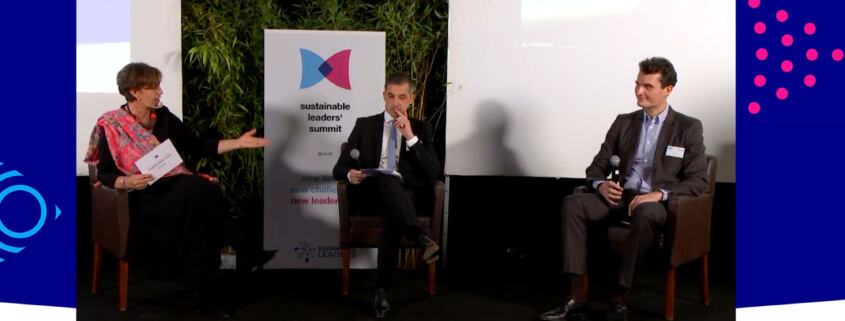Sustainable Leaders’ Summit: sustainability at the heart of managerial professions
The Sustainable Leaders’ Summit took place both online and physically the 26th of November. It gathered a group of inspirational leaders to discuss the sustainable transition of the European economy. This first edition encouraged managers, social partners and policymakers to pursue change into the workplace and society at large. The one-day event provided important insights on how to bridge the gap between sustainability ambition and reality – by mainstreaming a new type of leadership that empowers sustainable impact through work.
Started in 2020, the Sustainable Leaders is a European project that introduced sustainable thinking and practices within leadership and management. The program provided leaders with training schemes to gain the necessary leadership knowledge to make sustainability work in the private and public sector. It was also designed to engage social partners and policy makers on this issue and to create policy recommendation to promote sustainable leadership. This very first summit celebrated the conclusion of the project and allowed for the speakers to discuss their findings. They debated about the sustainability challenges managers are facing in their profession and reviewed topics such as climate emergency, circular economy and sustainability education.
‘Managers need training to cope with the new challenges of their evolving jobs’
As CEC’s President Maxime Legrand underlined, jobs and particularly managers’ jobs are constantly evolving. To support the managers and help them understand the current environmental and economic challenges, consistent training and emphasis on education must undergo within the workplace.
Professors Alberto Pastore and Annalisa Massacesi of Sapienza University Rome explained: ‘We need skills for making jobs greener and we need skills to invent new green jobs, thinking them together will be key to achieve our sustainability objectives.’
Throughout their presentation, the academics addressed the skills gap and the lack of sustainability awareness among managers across Europe. Although some concepts and knowledge start being integrated in the workplace, sustainability values and competences are not yet mainstreamed within the corporate environment.
They concluded: ‘A manager who can identify, inspire and implement new strategies, policies and managerial behaviors consistent with the sustainability principles is a sustainable leader. However, Eu managers don’t seem entirely ready for the sustainable transition.’
New leadership for new times
Speakers and academics argued for the need of a new sustainable leadership within a context marked by economic instability, ecological degradation and social polarization. This leadership approach should also open to a younger leadership mindset. Millennials and Gen-Z are entering the job market with different perspectives and expectations than the previous generations. They no longer want to settle for a job, they are looking for a job with meaningful impacts on society, in lines with their values.
Speakers encouraged the active involvement of younger generations, next to social partners and civil society within the EU’s transition policies, but also in corporate sustainability strategies. Without taking people on board and empowering them for sustainable jobs, we won’t go far, observed Esther Lynch from ETUC: ‘There are whole communities, around coal or the automotive industry that are afraid of the impact of the transition. We need to take these workers on board to make sustainability a success’
All sectors will be subjected to restructuring and managers play a key role in this transition. Industries and managers need to understand the trends of today and adjust their performance indicators to focus on well-being, health and happiness.
Finally, managers should be included in policies and packages regarding sustainable employment and leadership. Institutions such as the European Commission must do more to ensure this transition toward sustainable practices across Europe.
New thinking patterns
The Sustainable Leaders’ Summit hosted several panel discussions, the last keynote presented by Carol Sanford urged the participants to re-think their approach to sustainability and business: ‘You cannot change the world by using the same thinking that created our problems. We need to re-examine ourselves and see our effects in the world. (…) By controlling, fragmenting and putting people and organizations into boxes, we produce degenerative effects. We need to move towards a living systems understanding.’
This first summit paved the way for leaders across Europe to incorporate sustainability in their core values but also to reevaluate their positions and priorities for their businesses. Social dialogue and social partners have to better support workers and managers in achieving these goals. Building new capacities and drafting fairer policies integrating education and sustainability will make the green transition possible. That’s why in early 2022, project leader CEC European Managers will publish the final report of the Sustainable Leadership Project, with a set of recommendations for mainstreaming sustainable leadership within private and public sector management.




